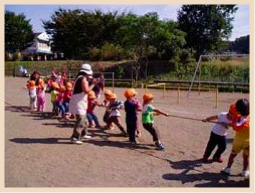
Todd Jay Leonard, Blog


A reader recently wrote to ask about early childhood education in Japan. Specifically, she was interested in learning about preschool education and what system is used regarding daycare, as well as kindergarten, and how Japanese parents fit into the picture.
This is a very interesting topic and one that I admittedly know little about, since I don't have any children of my own. So, I enlisted the help of a good friend who has experienced "early childhood education" in Japan four times with her children.
There are basically two systems that are used in Japan with regard to early childhood education. From birth to age 6, children can be enrolled into a "hoikuen" (nursery), which is classified as a "daycare center."
These are primarily geared toward the "welfare" of the child and are regulated by the Ministry of Welfare under the Child Welfare Law. The emphasis of hoikuen is to take care of the child physically and mentally.
In contrast, the "youchien" (kindergarten) system, for children ages 3 to 6, is regulated by the Ministry of Education under the School Education Law of 1947. These schools are geared toward the education of children.
The hoikuen system is very convenient for working parents, because the hours it can be utilized are quite flexible and much longer than the youchien system. A typical kindergarten allows children to stay up to six hours in a day, where as a hoikuen will allow children to come early and stay late each day, depending on the parents' schedule.
The youchien fee for a child is fixed, and the price depends upon whether it is public or private. The hoikuen fee is based on the income of the parents, allowing lower-income families to have equal footing with more well-to-do families.
One aspect I personally found very interesting regarding the average nursery school in Japan is the practice of keeping a daily diary ("nikki") that details the highlights of the child's day, from extraordinary to mundane events.
The nikki features daily entries by both the parents and the teachers. The diary itself travels back and forth from home to school in the child's bag each day. Every afternoon during nap time, the teachers read what the parents wrote the night before, and then write about the child's day thus far for the parents to read later that evening.
This diary system is an excellent way to keep parents and teachers abreast of the child's school and home life. A typical entry includes details about the child's daily routine: foods eaten, sleep habits, language development, playtime and interactions with other children.
The following excerpts are two nikki entries written by the teacher for my friend's child, Satoshi:
April 2006
"This morning, Sakura-chan in Momo Class (1-2 year olds) was lying on the floor crying. As soon as Satoshi saw her, he went over, held her hand and spoke gently to her. He really is becoming a big brother, isn't he? Later, out on the playground, he was pushing the trucks over to one corner, where he made a car park (parking lot). Next to that, he was shoveling sand into a toy truck until it was piled high. He looked like a real workman!"
May 2006
"Today we played outside all day. We went for a walk, and Satoshi was happy to see the 'koi-nobori' (banners shaped like fish). He showed them to me and kept saying 'fish.' After picking flowers, looking for insects and enjoying lots of nature, we used big sheets of cardboard to slide down the grass hill. Satoshi really enjoyed it, sliding down again and again. When we were tidying up this afternoon, Satoshi was really helpful, working right up until we finished."
Generally, the diary tends to focus only on the positive aspects of the child's life, with both parents and teachers including favorable content about the child. Interestingly, I was told by my friend, that - for example - if one's child is bitten by another child at school, the teacher will verbally inform the parent of the child bitten to explain and apologize about what happened. The parents of the child who did the biting may never be told.
Now, if a parent specifically inquires about their child, for example, "Little Koji has been biting his sister at home. Does he do it here?" The Japanese teacher most likely will still try to give the situation a positive spin by replying, "Well, occasionally, but only when provoked."
This is enough information, however, for the parent to know the situation and then decide how to deal with it at home.
The idea behind this is that children will be children, it is most likely a phase the child is going through and it is best not to bring too much attention to the bad behavior.
My friend related to me that she has witnessed what she labeled "peer discipline" being used by teachers at her son's nursery school. Children are encouraged to intervene in other children's disputes as minimediators.
Of course, the teacher would intervene if the dispute was really out of hand, but the teacher may watch from a distance and mention to another child, "Look over there. I wonder what they are going on about?" The child often will volunteer to go over and check out what is happening, mediating the disagreement by encouraging the other two to stop their fussing.
In general, child rearing in Japan allows for more raucous behavior by small children to be tolerated than what Americans normally find acceptable. Discipline is rarely done, allowing small children a lot of freedom to act and behave as they wish.
However, once they reach a certain age, societal pressure kicks in and children are expected to walk a straight and narrow line. By the time they are in junior high school, they have been transformed into obedient and respectful little individuals.
There is little wiggle room from around this age for any bad behavior; peers will quickly put wayward students in their place. In severe cases, students who don't fit in socially are bullied, and, recently, there have been a rash of junior high school children committing suicide in Japan because of peer bullying - some physical and some mental.
This is a sad reality, indeed, considering how carefree and happy-go-lucky their lives most likely were when they were small children.
By TODD JAY LEONARD
Columnist
Early education
Japan has two systems for preschool instruction
Monday, November 20 , 2006







